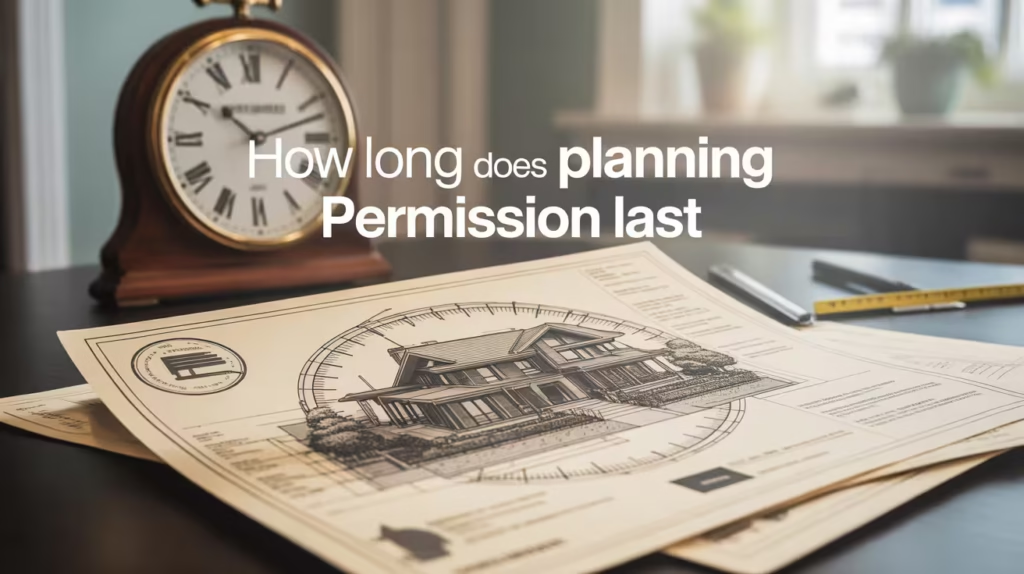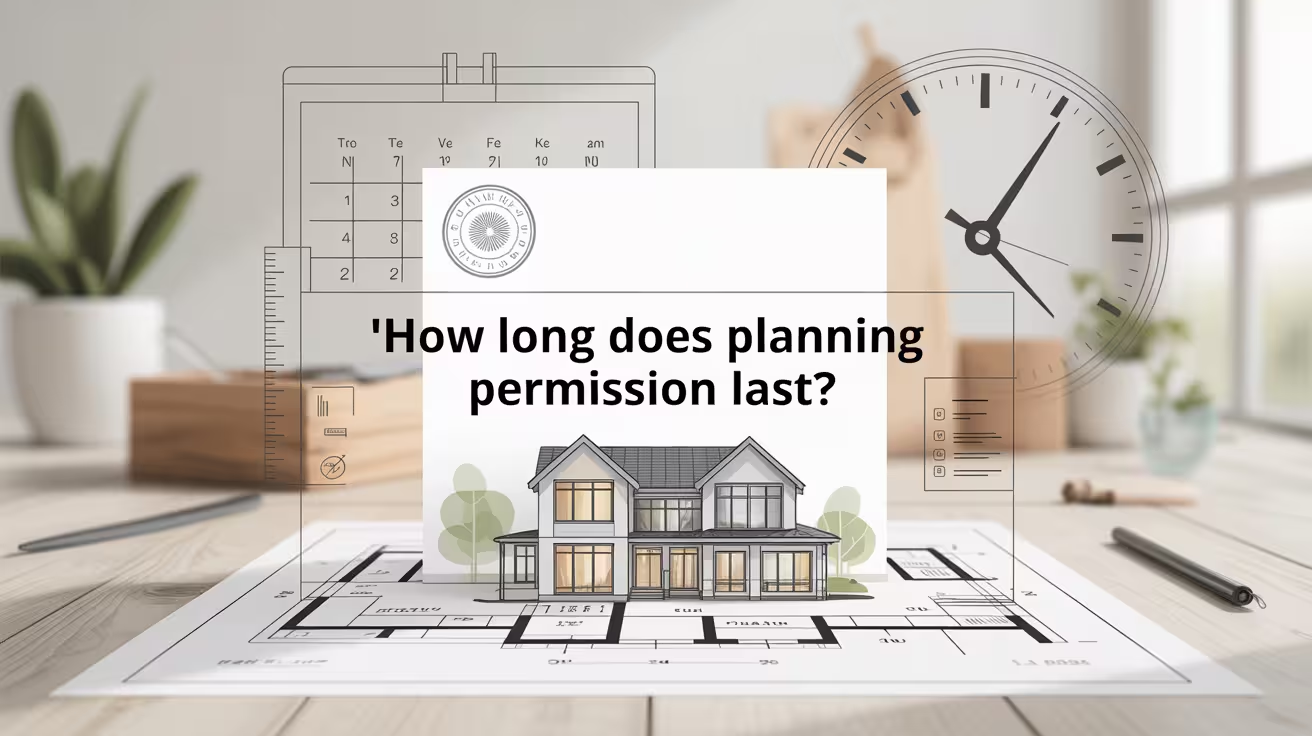Planning permission is one of the most important approvals you need before starting any significant building or development project in the UK. It gives you legal consent to carry out work that would otherwise be restricted under planning laws. However, this consent is not indefinite, every planning approval comes with a fixed time limit, and failing to start work within that period can mean losing your rights and having to apply again. In 2025, the standard validity rules remain largely unchanged, but local councils are applying them more strictly. Homeowners, developers, and architects need to be clear on exactly how long their permission lasts, what counts as starting work, and what to do if the expiry date is approaching. This guide by the professional architecture at Formi Architecture explains the different types of planning permission, the exact durations for each, how to keep permissions active, and what options exist if your approval is about to lapse or has expired. By understanding these rules early, you can avoid costly delays and protect your project’s timeline.
Introduction – Understanding Planning Permission Validity in the UK
Planning permission is one of the most important steps in any building project, whether you’re extending your home, constructing a new property, or changing the use of land. However, many homeowners and developers are caught off guard by how quickly this approval can expire. If your planning permission lapses before you start work, you could lose months of preparation and thousands of pounds in costs. In 2025, the UK rules for planning permission are clear, but they are strictly enforced. Councils have no obligation to remind you of expiry dates, and once permission runs out, the only way forward is often to reapply, which may mean facing new planning policies or increased opposition. This makes it essential to understand exactly how long your planning permission lasts, what counts as starting work, and what you can do if your approval is nearing its deadline. In this guide, we’ll explain the different validity periods, common mistakes that cause people to lose permission, and the steps you can take to keep your approval alive.
How Long Is Planning Permission Valid?

Planning permission in the UK generally has a fixed time limit, and the clock starts ticking from the date the local authority issues your decision notice. The length of validity depends on the type of permission you have, and in most cases, the time period cannot be extended without making a new application. Knowing your exact expiry date is critical because work must begin before that deadline, starting too late means your permission becomes void. While the majority of permissions last for three years, the details can differ based on whether you have full planning permission, householder planning permission, or outline planning permission.
Full Planning Permission Duration
Full planning permission is the most common type issued for complete, detailed proposals. This includes new builds, large extensions, and significant alterations to existing properties. Under current UK law, full planning permission is valid for three years from the date it is granted. If you do not start work within that three-year period, the permission expires, and you will have to reapply. Starting work means more than simply buying materials or hiring contractors, there must be actual, measurable construction activity that meets the legal definition of commencement. Some councils may impose shorter or longer deadlines for unique projects, but three years remains the standard timeframe in 2025. This time limit is designed to ensure developments happen in a reasonable period and reflect up-to-date local planning policies. Delaying a project for too long can mean conditions have changed, such as new zoning rules, environmental requirements, or community objections, so councils want work to start promptly.
Householder Planning Permission
Householder planning permission applies to smaller residential works, such as single-storey extensions, loft conversions, porch additions, or garden buildings. Like full planning permission, it usually lasts for three years from the date of approval. While these projects are typically less complex, they still require careful planning to avoid missing deadlines. Some homeowners mistakenly assume that small-scale projects are exempt from time limits, but this is not the case. Councils enforce expiry dates just as strictly as they do for larger developments. If your householder permission lapses, you will need to resubmit your application, pay new fees, and potentially face updated building regulations. In some cases, delays happen because people wait for ideal weather or financial readiness, but this can be risky if the three-year window passes before any qualifying construction begins.
Outline Planning Permission
Outline planning permission allows you to get approval in principle before submitting detailed designs. It is often used for large developments or projects where the design will be finalised later. In the UK, outline planning permission comes with a two-stage timeline. First, you must submit your reserved matters application, the detailed plans, within three years of the outline approval. Once the reserved matters are approved, you then have an additional two years to start construction. This means that in total, you may have up to five years, but only if you meet both deadlines exactly. Missing the reserved matters stage means the entire outline permission becomes invalid. This staged approach ensures councils can re-assess the project details against current planning policies before building work begins.
What Counts as ‘Starting Work’?
One of the most misunderstood aspects of planning permission is what actually qualifies as starting work. The law is very specific on this point, you cannot simply order materials, sign a contract with a builder, or clear vegetation from the site and claim that your project has begun. Councils look for clear, physical evidence of construction work that meets the official definition of “commencement of development” as set out in the Town and Country Planning Act. This definition exists to stop people from making token gestures in order to extend their permission without real progress.
If your planning approval includes pre-commencement conditions, such as submitting construction drawings or agreeing drainage plans, these must be discharged before you can legally start work. Failing to meet these requirements can lead the council to declare your permission expired, even if physical work has taken place. This is why it is crucial to confirm with your local authority that all conditions are cleared before breaking ground.
Legal Definition of Commencement of Development
The legal definition is straightforward but strict. Commencement typically means that permanent works forming part of the approved development have begun on site. This may include digging and pouring foundations, erecting structural walls, or installing drainage systems that are part of the main project. Temporary works, like site fencing or portable cabins, do not qualify. Importantly, councils will expect to see clear evidence, such as photographs, contractor reports, or site inspection notes, to prove the start date if it is ever questioned. This becomes especially important if there is a dispute about whether you met the deadline before your permission expired.
Examples That Qualify and Don’t Qualify
Work that qualifies as starting includes:
- Excavating foundations and laying concrete.
- Installing permanent drainage or service connections linked to the approved plan.
- Building structural walls or support columns.
- Undertaking demolition where it is integral to the approved development.
Work that does not qualify includes:
- Clearing vegetation or debris from the site.
- Placing temporary site offices, fences, or hoardings.
- Buying and storing building materials.
- Minor ground levelling or marking out without structural work.
In practice, disputes arise when developers do small amounts of qualifying work but fail to progress the build for years. While the law does not require you to complete the project within the original permission period once it has started, councils can still take enforcement action if they believe the work was minimal and carried out only to preserve permission. For this reason, it is wise to move quickly into full construction after commencement.
What Happens If Your Permission Is About to Expire?

If your planning permission is close to expiring, time is not on your side. Many property owners underestimate how quickly the deadline can arrive, especially if they have spent a significant portion of the three-year validity period finalising designs, securing finance, or addressing pre-commencement conditions. Once the expiry date passes without valid commencement, your approval becomes void, and you cannot continue with the project unless you reapply and receive fresh permission. This can be costly, time-consuming, and in some cases, risky, as planning policies may have changed, making approval less likely.
It’s essential to monitor your planning permission timeline closely. Keep a record of your grant date and any conditions that must be met before starting. If you are six months from expiry and have not yet begun qualifying work, you should treat the situation as urgent. At this point, delays in securing contractors, materials, or council inspections could put your entire project at risk.
Signs You May Be at Risk
There are several warning signs that your permission could lapse:
- You are still finalising building control approval with only months left.
- Your chosen builder has a full schedule and cannot start until after the expiry date.
- Pre-commencement conditions remain outstanding.
- You have not yet secured financing or signed a contract for the main works.
If any of these apply, you need to act immediately. Even if you think you can start in time, unforeseen setbacks like bad weather, contractor illness, or supply chain issues can delay the start of qualifying work.
How to Act Before the Deadline
To prevent your permission from lapsing, you need a clear and practical action plan:
- Clear Pre-Commencement Conditions – Submit all required documents to your local authority and obtain written confirmation that conditions are discharged.
- Book Your Builder Early – Confirm start dates with contractors, and make sure they understand the urgency.
- Start Qualifying Work – Begin permanent, approved construction work that meets the legal definition of commencement.
- Document Everything – Take dated photographs, keep invoices, and request site inspection notes from building control to prove the start date if questioned later.
Acting decisively can save you from the significant cost and uncertainty of reapplying for planning permission. Once valid work has begun, the permission will remain live indefinitely for that specific project, although you will still need to comply with building regulations and other approvals as construction continues.
4. Can You Extend or Renew Planning Permission?
Planning permission is not open-ended, and once it is close to expiry, many homeowners hope they can simply apply for an extension. Unfortunately, as of 2025, automatic extensions, which were temporarily allowed during certain past periods, are no longer in place. This means that once your permission expires, it cannot simply be extended by filling out a short form. You will generally need to submit a fresh application if the deadline passes without valid commencement.
There are limited situations where local councils may grant an extension without requiring a full reapplication, but these are rare and often linked to exceptional circumstances. For example, if delays are directly caused by legal disputes, environmental factors, or statutory authority actions beyond your control, a council might consider extending your timeframe. However, even in these cases, strong supporting evidence will be required, and approval is not guaranteed.
If your project is at risk, you must check with your planning officer early. Waiting until the last few weeks before expiry will leave little room to prepare, and most councils take several weeks to assess any application or request.
Current Rules on Extensions (2025 Update)
Under the current system, the majority of planning permissions will expire three years after approval unless qualifying work has begun. The law does not give homeowners an automatic right to extend this period. Some councils may allow a “minor material amendment” application to keep permission alive if only small changes are required, but this is not the same as a formal extension.
The only realistic way to keep your project moving without a new full application is to start legally recognised construction before the expiry date. Once you have commenced valid work, your permission remains live indefinitely for that specific development. This is why careful timing and record-keeping are so important.
Reapplying vs Renewing – What’s Possible
If your permission lapses, you cannot “renew” it in the traditional sense. You must reapply using a new planning application, following current policies and submitting the required plans, forms, and fees. However, having a previously approved scheme can work in your favour, councils may look more favourably on repeat applications if there are no major policy changes or local objections.
Still, you should not assume approval will be automatic. If your local plan or national planning policies have changed since your original application, or if neighbouring developments have altered the character of the area, the council could impose new conditions or even refuse the proposal. This makes acting before expiry the safest and most cost-effective approach.
Reapplying for Expired Planning Permission

Once permission expires without commencement, your only option is to reapply. This process can feel like starting from scratch, but there are ways to make it smoother.
What Changes in a Reapplication
One of the main risks of reapplying is that planning policy may have shifted since your original approval. Councils update their local plans regularly, and national rules can also change. For example, height restrictions, environmental requirements, or heritage protections may have been introduced since your original permission was granted. These changes could mean your project now faces new design constraints or additional assessments, such as flood risk or ecological surveys.
Additionally, a new application will require paying the relevant planning fee again, and you will need to resubmit all drawings, site plans, and supporting documents. Any pre-application advice you previously received may no longer apply if regulations have changed.
Tips for Improving Approval Chances Second Time
If you must reapply, treat it as an opportunity to strengthen your proposal. Consider:
- Working with an experienced planning consultant or architect to review your design against the latest policies.
- Addressing any objections from your previous application to improve community support.
- Submitting stronger evidence, such as updated surveys, impact assessments, or visualisations, to help the council understand the benefits of your project.
This approach not only increases your chances of approval but can also reduce the risk of costly conditions being added to the new permission.
Common Mistakes That Lead to Losing Planning Permission
Many homeowners lose their planning permission through preventable errors. Common mistakes include:
- Missing key pre-commencement conditions such as ecology surveys, contamination reports, or highway agreements.
- Misunderstanding the time limit, believing the three-year period starts from another date (such as when building control approval is granted).
- Relying on informal verbal advice from builders, neighbours, or council staff without confirming in writing.
To avoid these problems, always work from official documents, keep detailed project timelines, and engage professionals who understand the planning process.
The 10-Year Rule and Lawful Development
The 10-year rule allows certain developments or changes of use that have existed without enforcement action for a decade to gain legal status through a lawful development certificate. While it does not revive expired planning permission, it can protect long-standing, unchallenged works from future disputes. Understanding how to document and prove continuous use is key to securing legal recognition.
What Is the 10-Year Planning Rule?
The 10-year rule in UK planning law refers to the time limit after which certain breaches of planning control can no longer be enforced. If a development has been in continuous use for more than 10 years without enforcement action from the council, it may become lawful. This applies mainly to changes of use, not physical works, and can be proven through evidence such as utility bills, tenancy agreements, and photographs.
How It Applies to Expired Permissions
It is important to note that the 10-year rule rarely helps with expired planning permissions. If your permission lapses before work begins, you cannot claim lawfulness after 10 years of doing nothing, the rule applies to completed developments in continuous use. However, in some cases where works have started unlawfully and remained without challenge, the rule could be relevant. A lawful development certificate can be applied for in such situations to formalise the status of the building or use.
How Formi Architecture Can Help with Planning Permission

At Formi Architecture, we guide clients through every stage of the planning process, from initial concept to approval. We ensure all conditions are met on time, advise on keeping permissions valid, and handle reapplications when needed. Our experience with local councils means we can anticipate issues, prevent costly delays, and give your project the strongest chance of success.
Expert Planning Advice and Application Management
We provide complete support for homeowners and developers from the early planning stages through to full approval. This includes preparing applications, managing pre-commencement conditions, and advising on the best strategies to keep permissions valid. Our team has extensive experience working with councils across the UK, meaning we understand how to navigate local policies and minimise delays.
Real Case Studies and Successful Outcomes
Our track record includes saving projects that were weeks away from expiry by securing rapid starts on site, as well as reapplying for lapsed permissions with updated designs that met new policy requirements. These successes demonstrate our ability to act quickly and strategically when deadlines are tight.
9. FAQs About Planning Permission Duration
Can I sell my property with valid planning permission?
Yes. Valid permission can make a property more attractive to buyers, especially developers. However, the expiry date still applies, and buyers must act within that time.
Does council delay or COVID-19 affect my expiry date?
Generally no. Unless there has been a specific government directive, the three-year rule applies regardless of external delays.
What happens if I change my design after approval?
Minor changes can be handled via a non-material amendment. Significant alterations will likely require a fresh planning application.
Suggestions – Stay Ahead of Your Planning Deadlines
Planning permission is a valuable asset, but it comes with strict time limits. Understanding when it expires, what constitutes valid commencement, and how to act before the deadline is essential to protecting your project. Delaying action risks losing approval entirely, forcing you to start over under potentially less favourable conditions.
The safest strategy is to plan backwards from your expiry date, clear all pre-commencement conditions early, and keep detailed records of when and how work starts. With the right professional support and careful timing, you can keep your permission alive and move your project from the drawing board to reality without unnecessary setbacks.






